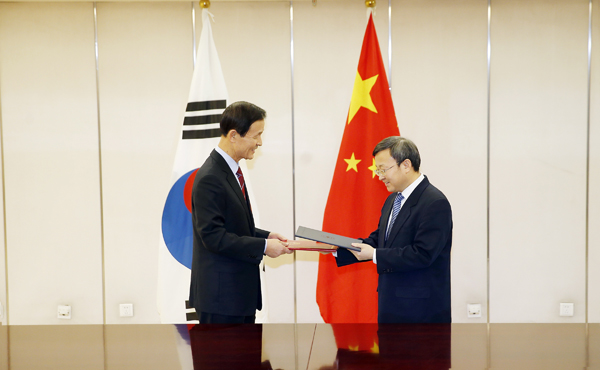Scholars seek to further broaden China-South Korea cooperation

On Dec. 9, Chinese Vice Minister of Commerce Wang Shouwen and South Korean Ambassador to China Kim Jang-soo exchange a diplomatic document confirming that both sides agree to implement the bilateral free trade agreement (FTA) on Dec. 20.
At an international symposium titled “New Era for China-South Korea Cooperation” in Beijing on Dec. 1, experts and scholars from the two countries discussed such topics as the China-South Korea Free Trade Agreement (FTA) as well as cultural and economic cooperation throughout Southeast Asia.
Cai Fang, vice-president of the Chinese Academy of Social Sciences (CASS), elaborated on China’s “the Belt and Road” strategy and its link with South Korea’s Eurasia Initiative aimed at boosting economic and trade ties with energy-rich Central Asian nations. He said “the Belt and Road” strategy is not a Chinese solo venture, but a cooperative effort that requires the participation of South Korea and other countries. It can be integrated into the Eurasia Initiative, so that the two countries can find common interests, and enterprises from both sides can expand business ties with each other, Cai said.
China’s 13th Five-Year Plan (2016-2020) emphasizes innovation, which is also one of South Korea’s strengths. There is a lot of useful experience that China can draw upon, especially in manufacturing. Therefore, the two countries have greater space in collaborative innovation and manufacture reforms, he said.
Ahn Se Young, chairperson of South Korea’s National Research Council for Economics, Humanities and Social Sciences (NRCS) said the approval of China-South Korea FTA by South Korea’s National Assembly is a sign of deepening cooperation between the two sides. He said the strategic partnership will be strengthened. Areas of cooperation will be broadened based on the FTA with the integration of “the Belt and Road” and the Eurasia Initiative, Ahn said.
Scholars pointed out that China-South Korea ties have been improved these years through economic cooperation.
“Economic and trade cooperation between our two countries is not only conducive to economic progress but also helps to deepen regional economic cooperation in Southeast Asia and promote world economic stability,” said Huang Qunhui, director of the Institute of Industrial Economics at CASS.
Because they are at different stages of industrialization, the two countries have respective advantages, which means that there are many opportunities for cooperation in exports, investment, technology and innovation, Huang said.
With increasing world influence, the two countries are leading economic development in Southeast Asia, said Wang Yuzhu, a research fellow from the National Institute of International Strategy at CASS. The proposed FTA between the two sides is of the highest level in the region, so cooperation between the two countries will become the driving force for creating common prosperity throughout Southeast Asia, Wang said.
Scholars also highlighted the role cultural exchanges play in promoting integration and building ties between countries, saying that they help to foster a better environment for cooperation in economics and foreign affairs.
They also proposed several measures for accelerating cultural cooperation between China and South Korea from many perspectives, including mechanisms for negotiating cultural policies, protecting copyrights, jointly entering into markets of other countries, exploring traditional cultures and expanding people-to-people exchanges.
Sponsored by CASS and the NRCS, the meeting was jointly organized by the Institute of Industrial Economics and the National Institute of International Strategy at CASS as well as the Korea Institute for Industrial Economics and Trade. Officials from South Korea’s Beijing embassy were also in attendance.
Zhang Fengna is a reporter at the Chinese Social Sciences Today.

 PRINT
PRINT CLOSE
CLOSE